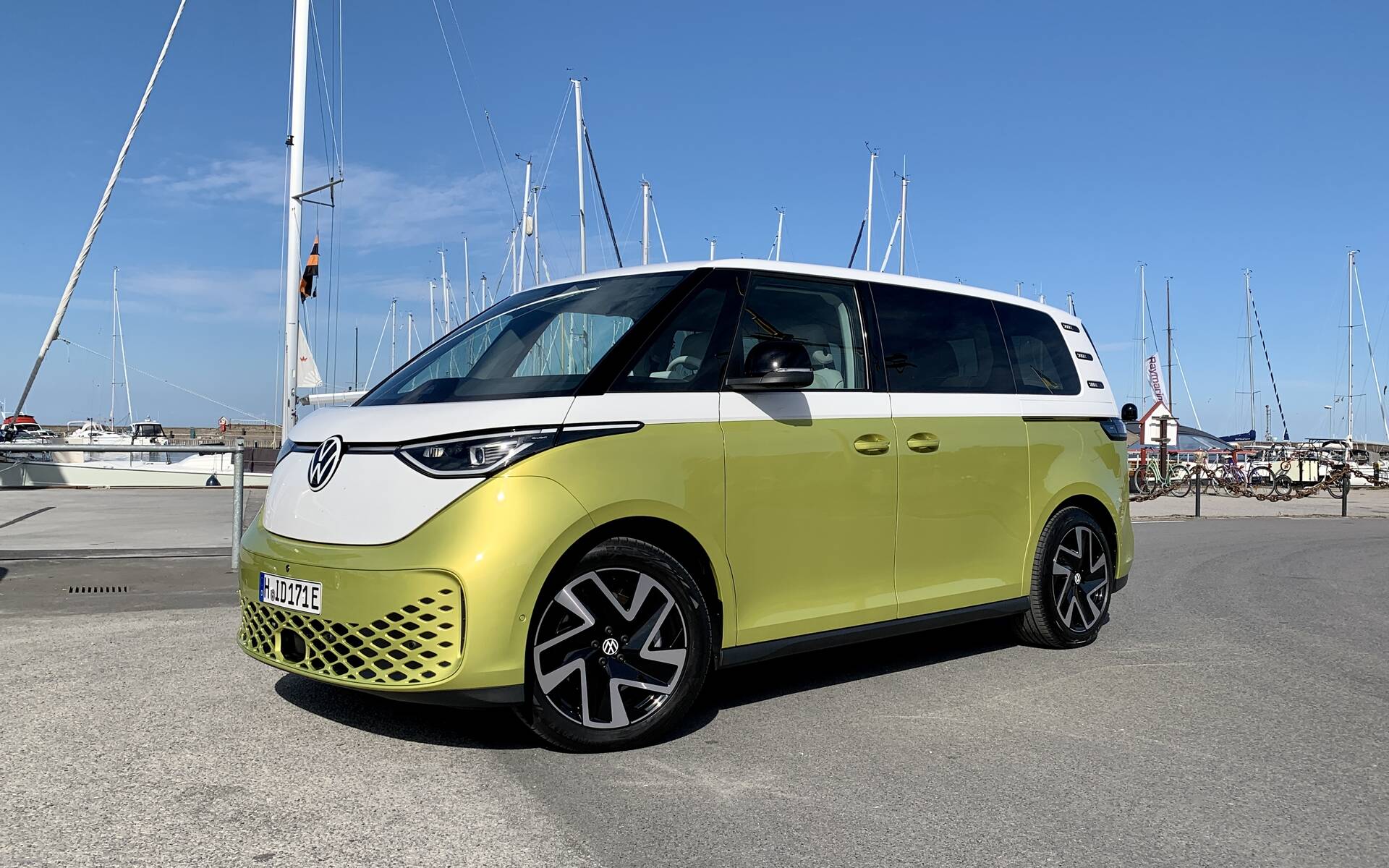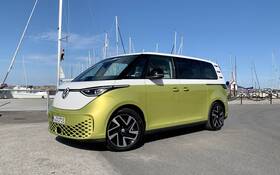Volkswagen ID. Buzz: The Bus’ Electrifying Return

| Strong points |
|
|---|---|
| Weak points |
|
For more than 20 years, Volkswagen has been teasing fans of the iconic Bus with various concepts and talks of a possible return. Well, it’s officially back now. Unveiled last March, the all-new ID. Buzz is a futuristic interpretation of the lovable van that’s set to join the German automaker’s lineup of electric vehicles.
The Car Guide was recently invited to Copenhagen, Denmark to take the Volkswagen ID. Buzz for a spin, driving all the way to Sweden where EVs are kings of the road. Below are our first impressions of what is arguably one of the most anticipated new models in a very long time.
- Also: Volkswagen ID. XTREME May Spawn Off-Road-Ready ID.4
- Also: 2023 Volkswagen ID.3: Tasting the Forbidden Fruit
Stunning Looks
A radical departure from the old Bus, the new ID. Buzz somehow keeps the past alive from a design standpoint. Similar to other retro-flavoured models such as the MINI Cooper or Volkswagen New Beetle, though, complying with modern safety standards and aerodynamics principles proved to be quite a challenge for designers.

The ID. Buzz features a flat yet muscular nose (with an oversized VW logo appearing front and centre), large greenhouse and a pair of sliding doors. A number of cool details have been incorporated throughout, like smileys behind the door handles or ID. Buzz silhouettes on the plastic section of the seats. The ornaments on the D-pillars are reminiscent of the vents on the original models.
As you can see on the pictures, a two-tone exterior is available, with customers picking the lower-body colour and the upper body dressed in white. The striking combination is oh-so lovely.
Of course, a single-tone exterior can be ordered, too, but the result isn’t always great. For example, the Lime Yellow and White combo looks nice, but an all-yellow package? Not so much. We’re particularly fond of the Laurel Green and Energetic Orange options. By the way, the body colour carries over to part of the dashboard and interior door panels, which is cool.

From Air-Cooled Engines to Electric Propulsion
From its introduction in the 1950s to its termination in North America in 2003, the legendary Type 2 evolved significantly. Sometime during the third generation (called Vanagon), liquid cooling made its debut and changed everything. A generation later, the engine was moved from the rear to the front, which also had a positive impact yet angered purists in the process. In the early 2000s, Volkswagen launched the Routan, a sort of rebadged Dodge Grand Caravan. Unsurprisingly, no one at the ID. Buzz presentation dared to mention it.
This time around, the combustion engine is gone and replaced by a fully electric drive unit based on the MEB architecture, the same that underpins the ID.4 crossover.
We started the day with the computer telling us the vehicle had 473 km of range (the official WLTP rating is 423 km). The weather conditions were ideal, with sunny skies and a temperature exceeding 20 degrees Celsius. After driving for a little more than 100 km on city streets, highways and country roads, the reading had dropped accordingly. It also said we achieved an energy consumption of 20 kWh/100 km. While regenerative braking can be adjusted, one-pedal driving is not possible with the ID. Buzz.

The 82kWh battery—shared with the ID.4—can be charged at a maximum of 170 kW. By the way, our tester was a single-motor, RWD unit delivering 201 horsepower. Nothing to write your mother about. However, thanks to the instant torque, the ID. Buzz enjoys a fair dose of get-up-and-go and seems to be light-years ahead of early-generation Bus models, which were known to be quite slow.
The ID. Buzz not only shares many components with the ID.4, but it also drives like one. Makes sense, doesn’t it? Obviously, the driving position is higher, and there’s a lot of real estate between the steering wheel and the base of the windshield, which reminds us of the old Chevrolet Lumina APV. The front quarter window is unusually large as a result.

While the vehicle looks relatively big and boasts a spacious, airy cabin, its actual footprint tells a different story. At 4.71 metres long, the Euro-spec model is nearly half a metre shorter than a 2022 Chrysler Pacifica. Our own ID. Buzz in North America will get 25 centimetres of extra wheelbase in order to accommodate third-row seats and offer decent cargo capacity. This seven-passenger variant will be officially unveiled early in 2023. A dual-motor configuration with AWD is also coming.
Oh, and there’s an ID. Buzz Cargo for fleets and businesses, as well, but that one won’t cross the Atlantic.
Electric Camper?
The original Bus owes much of its fame to multiple camper conversions, particularly those by Westfalia. With the growing number of Van Life enthusiasts these days, many people are curious to find out whether the ID. Buzz will get the same treatment.
Remember, these conversions were performed by independent companies, since no automaker would want to cover a vehicle equipped with plumbing, power appliances and a pop-up roof. That being said, Volkswagen is not shutting the door on the idea of offering special models for those who like to go camping.

Be Patient
In Europe, the ID. Buzz will arrive at dealerships in a few weeks, which is why we got the opportunity to do a test drive this soon. Canadians will have to wait much longer—until the first half of 2024, to be exact. Yeah, we know, this sucks. At about the same time, an electric fastback sedan called ID. Aero will also join the lineup. The Hanover plant will build ID. Buzz units for all global markets, so you can imagine how long delivery times will be.
Our expectations for this new electric minivan were admittedly pretty high, and yet we weren’t disappointed. While capturing the spirit of its predecessors, the ID. Buzz manages to be highly sophisticated and futuristic. Of course, it’s way too early for the folks at Volkswagen Canada to give us any idea of how much it will cost.
This much is certain, though: as minivan sales keep falling across North America, the Volkswagen ID. Buzz is bound to resurrect not only an automotive icon but also revive an entire segment.











